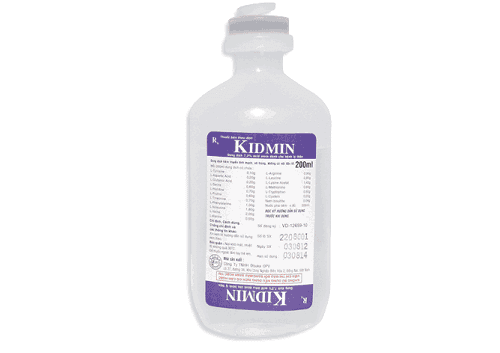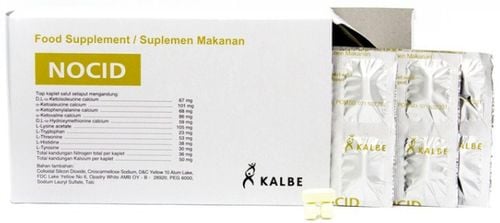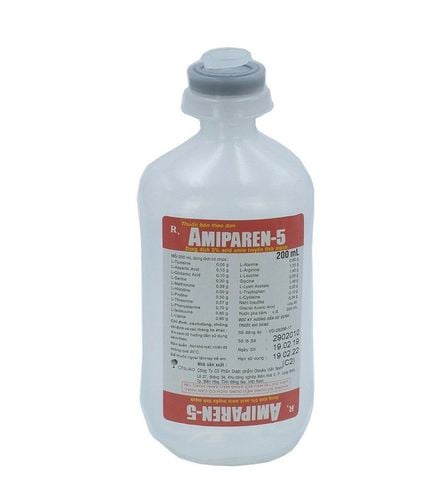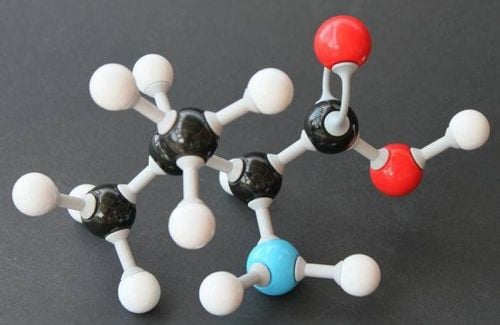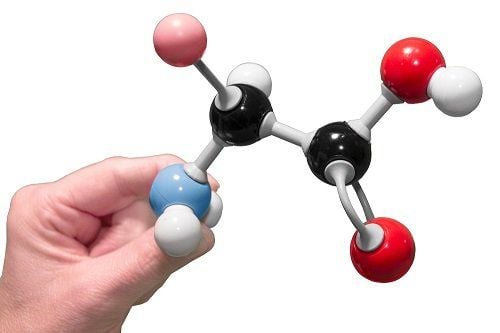This is an automatically translated article.
Amino acids are the building blocks of proteins. Supplementing with essential amino acids every day helps promote physical health, muscle strength and improves mood. There are 9 different types of essential amino acids but all bring many benefits to the body.1. Lysine
The American Dietetic Association recommends a daily intake of 38 mg of Lysine per kilogram of body weight. Lysine plays an important role in the following processes:Protein synthesis and muscle building; Calcium absorption helps maintain bone strength, aids in recovery from injury or surgery; Regulate hormones; Generate enzymes and antibodies with antiviral effects, enhance immune system function; Provide energy to the body; Production of collagen and elastin. Although there isn't much research on the consequences of lysine deficiency in humans, one study in rats found that a lack of this essential amino acid can lead to feelings of anxiety caused by stress.
2. Histidine
Required amount of Histidine: 14 mg/1 kg/day.Histidine facilitates the formation and growth of blood cells, as well as helps to regenerate tissues. This essential amino acid also helps maintain the special protective layer that covers nerve cells, known as the myelin sheath.
The body converts Histidine to histamine - a neurotransmitter that is important for:
Immune reactivity; Reproductive and sexual health; circadian sleep-wake cycle; Digestive system function. The results of a study in women with obesity and metabolic syndrome showed that taking Histidine supplements was able to reduce their BMI and insulin resistance. Histidine deficiency puts you at risk for anemia, especially in people with arthritis and kidney disease.

Thiếu hụt Histidine gây nguy cơ thiếu máu
3. Threonine
Threonine required content: 20 mg/1 kg/day.Additional amino acid Threonine is essential for firm skin and healthy teeth. This essential amino acid is a major component of structural proteins such as collagen and elastin, found in tooth enamel, skin, and connective tissues. Threonine also helps support fat metabolism and immune function, which may be beneficial for people with indigestion, anxiety and mild depression.
A study in 2018 found that Threonine deficiency in fish makes them less resistant to disease.
4. Methionine
Methionine (+ non-essential amino acid cysteine) required: 19 mg/1 kg/day.Methionine and the non-essential amino acids cysteine are responsible for the strength and elasticity of skin, hair and nails. This amino acid supplement is also essential for metabolism and detoxification, specifically Methionine has the following uses:
Helps in tissue growth; Absorb important minerals zinc and selenium; Removes heavy metals, such as lead and mercury.
5. Valine
Required Valine content: 24 mg/1 kg/day.Valine is one of three branched chain amino acids, along with Leucine and Isoleucine. Valine has the following functions:
Stimulate muscle growth and regeneration; Supports motor coordination between muscles; Involved in the production of energy; Helps with mental focus and emotional control. A deficiency in this essential amino acid can cause insomnia and mental decline.

Thiếu hụt Valine có thể gây mất ngủ và sa sút tinh thần
6. Leucine
Required Leucine content: 42 mg/1 kg/day.Similar to Valine, Leucine is also a branched chain of amino acids that is essential for protein synthesis, supplementing with Leucine amino acids has the following uses:
Supports muscle tissue regeneration and bone development; Regulate blood sugar; Stimulates wound healing; Production of growth hormone. Leucine deficiency can lead to skin rashes, hair loss, and fatigue.
7. Isoleucine
Required Isoleucine content: 19 mg/1 kg/day.Isoleucine is the last of the three branched chain amino acids, which are mainly found in muscle tissue and play the following roles:
Helps in wound healing; Increases immunity and metabolism in muscles; Regulate blood sugar; Production of hormones and hemoglobin; Regulate energy levels. Older adults are at greater risk of Isoleucine deficiency than young adults. It is this deficiency that causes muscle atrophy and tremors in the elderly.
8. Phenylalanine
Required Phenylalanine (+ non-essential amino acid tyrosine) content: 33 mg/1 kg/day.Phenylalanine is a precursor to neurotransmitters, including tyrosine, dopamine, epinephrine, and norepinephrine. This essential amino acid plays an integral role in the structure and function of proteins and enzymes, and produces and helps the body use other amino acids. Meanwhile, tyrosine, a metabolite of Phenylalanine, is essential for a number of specific brain functions.
Although Phenylalanine deficiency is rare, it can lead to poor weight gain in babies and to eczema, fatigue and memory problems in adults.
Phenylalanine amino acid found in which foods? Phenylalanine is commonly found in the artificial sweetener aspartame, which is used by manufacturers to make diet sodas. Large doses of aspartame can increase the concentration of Phenylalanine in the brain and cause feelings of anxiety, restlessness, and sleep disturbance.
A rare genetic disorder, called Phenylketonuria (PKU), causes people to be unable to metabolize Phenylalanine. Therefore, these subjects need to know which amino acid Phenylalanine is present in to avoid consuming too much.
9. Tryptophan
Tryptophan required: 5 mg/1 kg/day.Tryptophan is essential for proper growth in infants, helps maintain nitrogen balance, and is a precursor to serotonin and melatonin, of which:
Serotonin: Is a neurotransmitter that regulates appetite , sleep, mood and pain sensations; Melatonin: Also has a sleep-regulating effect. Tryptophan is considered a sedative and is an ingredient in sleep aids. Research on healthy women shows that supplementing with the amino acid Tryptophan has the ability to help them feel more excited as well as better control emotions.
Tryptophan deficiency can cause pellagra (open skin lesions), risk of dementia, skin rashes and digestive problems.
In summary, we should learn which amino acids are in foods to ensure adequate supply of this nutrient for the body every day. But today's modern diets also make essential amino acid deficiencies no longer common in people with good health. Therefore, it is important to consult your doctor before you want to use additional amino acid supplements.
Please dial HOTLINE for more information or register for an appointment HERE. Download MyVinmec app to make appointments faster and to manage your bookings easily.
Reference source: medicalnewstoday.com; healthline.com



